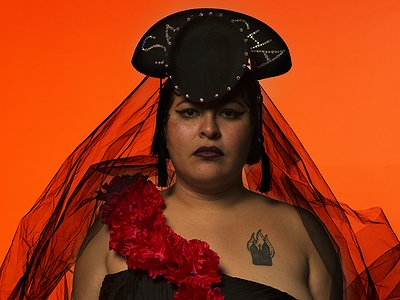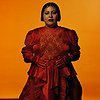Part 1
Name: San Cha
Nationality: Dual citizenship u.s.a. And Mexico
Occupation: Vocalist / entertainer/ artist
Current Release: Capricho Del Diablo EP on Outside Insight
Recommendation: Dorian Woods’ Xala / Tyler Holmes’ Marriage
You can listen to and buy San Cha's music at sancha.bandcamp.com
When did you start writing/producing music - and what or who were your early passions and influences? What is it about music and/or sound that drew you to it?
I started writing music in high school, but I began to seriously produce music when I was about 20. My first huge obsession was Gloria Trevi, she sang pop music with very heavy early rock n roll bluesy influences. Her voice was very raspy and raw and it sounded like she was growling every lyric. I’ve gone through many phases with my music, but now I’ve occupied a place very close to my first memories of seeing Gloria Trevi screaming and rolling around on the ground.
For most artists, originality is first preceded by a phase of learning and, often, emulating others. How would you describe your own development as an artist and the transition towards your own voice? What is the relationship between copying, learning and your own creativity?
The process for me has been non-linear.
The real process has been:
1. Me failing to emulate anyone
2. Church choir
3. Voice lessons in college
4. Becoming a drunk drag queen singing at punk shows, dive bars and art openings
5. Resurrecting with heavy belting mariachi singing.
I’ve been singing for such a long time, when I was a kid I wanted to sound like Selena and Britney Spears and I failed miserably to try and emulate them. I was always told my voice was “different” or “haunting,” while singing in the school and church choirs.
I took my first voice lessons in college and they would have me listen to other people to imitate and learn from, but that method did not click with me at that time. I dropped out and started singing at drag shows, backyard shows, art openings and writing for myself. I’ve always just thrown myself into things and I’ve learned so much about my voice by singing drunk at night clubs or backyard/house shows, and following drag performers. Having to deal with bad microphones and amps has taught me a lot of patience and projection and how to overcome bad sound with the one instrument I always carry with me, my voice. Once I was immersed in the performance world I remembered my vocal lessons and somehow after all that experience those teachings started to make sense to me. Then, I revisited some of my favorite Mariachi singers and emulated that style of singing and was able to do it convincingly.
A lot of what I write now is a blend of my early church upbringing, classical technique and theory, drunk drag, mariachi and pop composition.
What were your main compositional- and production-challenges in the beginning and how have they changed over time?
My compositional challenges came from not understanding how to use recording equipment. I had an early mentor that taught me how to make music on my own. She taught me Reason and Garageband and I learned to record layers and use grids to develop my sound. I’ve since been able to learn Abelton Live, Logic and Reason and have been able to revise and re-record my ideas.
What was your first studio like? How and for what reasons has your set-up evolved over the years and what are currently some of the most important pieces of gear for you?
My first studio was a Dell laptop and a condenser mic that I never figured out how to make work with my laptop that I also later dropped and stopped working. I used Audacity to record. I had just left my boyfriend and moved back to my mom’s house, so I was recording in the laundry room which is really just a shed in the backyard.
I learned from many other laptop producers and figured out the most basic set up I could have. I have a laptop with Ableton and Garage Band, a midi controller, an audio interface, and a condenser microphone. I also like to use the Garage Band on my iPhone to get ideas started, it’s one of my most important pieces of equipment.
How do you make use of technology? In terms of the feedback mechanism between technology and creativity, what do humans excel at, what do machines excel at?
I like using technology as a grid that records me and documents my ideas. Technology excels at documenting the moment in a non-biased form. Humans excel at having oceans and tides of emotions and being vessels for spirits of other realms to take over at the right moments.
Production tools, from instruments to complex software environments, contribute to the compositional process. How does this manifest itself in your work? Can you describe the co-authorship between yourself and your tools?
I like using software to show me a song visually. I love the cutting and pasting and deleting of parts of songs.; being able to move the end into the beginning or to whatever part of the song I want. I love being able to see notes as rectangles and to be able to draw arpeggiations on a grid. Software is there to give me tools to create more freely and give me room to improvise and then revise the improvisation.
Collaborations can take on many forms. What role do they play in your approach and what are your preferred ways of engaging with other creatives through, for example, file sharing, jamming or just talking about ideas?
I love to first share space and special intimate moments with other collaborators. I love to have a personal connection first then an effortless working one. I do not like to share files, for some reason that has never worked out for me. I like to be approached with smaller ideas like riffs, or having jam sessions is my favorite way to collaborate. I like to be able to talk about direction as we’re improvising and having our technology capture the magic.
Could you take us through a day in your life, from a possible morning routine through to your work? Do you have a fixed schedule? How do music and other aspects of your life feed back into each other - do you separate them or instead try to make them blend seamlessly?
I definitely do NOT have a typical morning routine. Music performance has taken over my life. At this point with so much of a performance schedule I like to record smaller ideas to go back to. When I write, I like to have entire days free at a time and hardly any interruptions. The method for me is to remove myself from distractions like the internet and any social events and to completely lose myself in new bodies of work.






